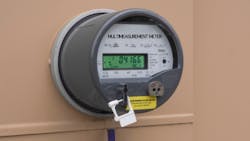ComEd Installs One Millionth Smart Meter
ComEd has installed its one millionth smart meter in its service territory. The mission of installing nearly four million smart meters began in 2013 and, on an accelerated timeline path, is expected to be complete in 2018 – three years ahead of schedule. A smart meter is a digital electric meter that uses two-way radio communications to collect usage information and securely transmit it to ComEd through a wireless connection.
“One million smart meters means one million customers now have access to tools and information that will help them better control and manage their energy use,” said Michael McMahan, Vice President of Automated Metering Infrastructure Implementation for ComEd.
Smart meters provide customers with access to more information about energy use through online energy-management tools. Additionally, because smart meters automatically send meter readings to ComEd, they also help eliminate estimated bills and reduce operating costs that become savings on customers’ electric bills.
Recently, ComEd reported out to the Illinois Commerce Commission for the first time on performance metrics for smart meters. The company reported that it had surpassed in 2014 targets in several categories including reduction of estimated bills, uncollected expenses and consumption on inactive meters. The positive performance results help to lower operational costs, which are passed directly to customers as rate savings.
In addition, Smart Grid investments have helped to strengthen reliability of the electric system by helping to avoid more than 3.3 million customer interruptions since 2012, including 1.2 million in 2014 due largely to increased investments in distribution automation or digital “smart switches” that automatically route power around potential problem areas. Outage avoidance has saved customers an estimated $175 million.
Working with Silver Spring Networks, ComEd is building a wireless communications network which allows smart meters to communicate customer electricity usage with ComEd. Already, however, the company is looking for additional opportunities to use the communications network to bring new technologies and benefits to its service territory.
Earlier this year, ComEd introduced a pilot program to deploy smart, energy-efficient LED streetlights in Lombard and Bensenville. Via a web portal, municipalities will be able to control the dimming and daily scheduling of the lights, and receive immediate notification if a lamp is in need of maintenance. Additionally, control can be given to first responders to manage streetlights on-demand during emergency situations. The LED streetlights, which consume as little as one-third of the energy, last up to one and a half times as long and offer better quality of light compared with the fixtures they replace.
With smart grid and smart meters producing customer benefits and savings, ComEd is advocating for legislation in Springfield to even more fully leverage the capabilities of the smart grid. This legislation – ComEd’s Future Energy Plan, Senate Bill 1879 – would expand access to renewable energy, increase energy efficiency, enhance resiliency and security of the system and meet the growing demand among energy consumers for more choice and personalized services.
“The advanced technology we are putting into place is creating a platform by which new innovation can be brought to the grid and create greater value for our customers,” said McMahan. “We’re committed to enabling our customers to take full advantage of the new technologies, transforming the way electricity is distributed and used by our customers.”
